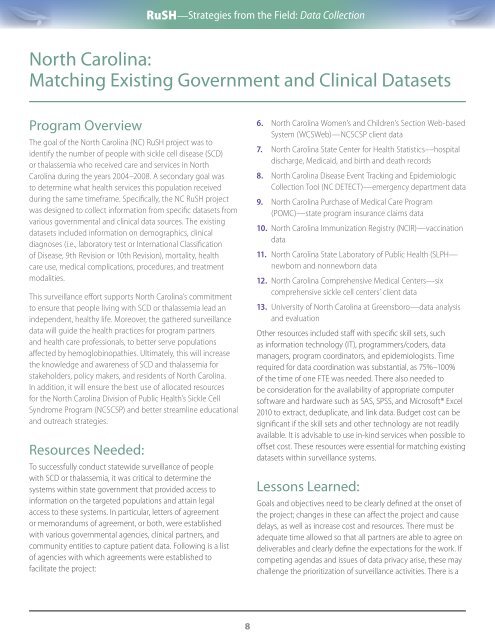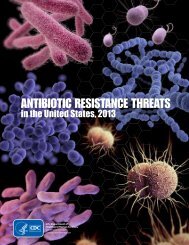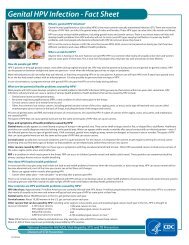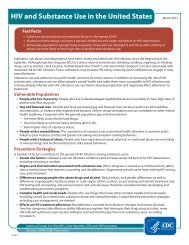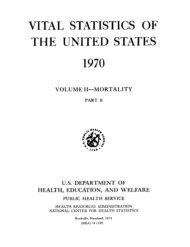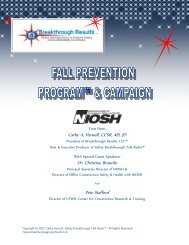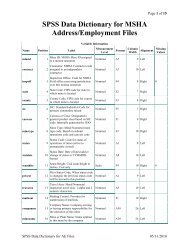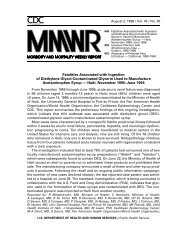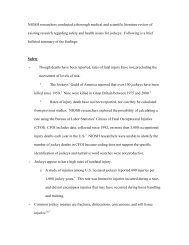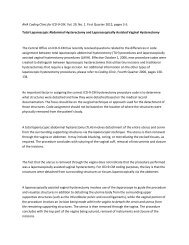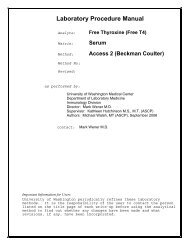RuSH: Strategies from the Field - Centers for Disease Control and ...
RuSH: Strategies from the Field - Centers for Disease Control and ...
RuSH: Strategies from the Field - Centers for Disease Control and ...
You also want an ePaper? Increase the reach of your titles
YUMPU automatically turns print PDFs into web optimized ePapers that Google loves.
<strong>RuSH</strong>—<strong>Strategies</strong> <strong>from</strong> <strong>the</strong> <strong>Field</strong>: Data Collection<br />
North Carolina:<br />
Matching Existing Government <strong>and</strong> Clinical Datasets<br />
Program Overview<br />
The goal of <strong>the</strong> North Carolina (NC) <strong>RuSH</strong> project was to<br />
identify <strong>the</strong> number of people with sickle cell disease (SCD)<br />
or thalassemia who received care <strong>and</strong> services in North<br />
Carolina during <strong>the</strong> years 2004–2008. A secondary goal was<br />
to determine what health services this population received<br />
during <strong>the</strong> same timeframe. Specifically, <strong>the</strong> NC <strong>RuSH</strong> project<br />
was designed to collect in<strong>for</strong>mation <strong>from</strong> specific datasets <strong>from</strong><br />
various governmental <strong>and</strong> clinical data sources. The existing<br />
datasets included in<strong>for</strong>mation on demographics, clinical<br />
diagnoses (i.e., laboratory test or International Classification<br />
of <strong>Disease</strong>, 9th Revision or 10th Revision), mortality, health<br />
care use, medical complications, procedures, <strong>and</strong> treatment<br />
modalities.<br />
This surveillance ef<strong>for</strong>t supports North Carolina’s commitment<br />
to ensure that people living with SCD or thalassemia lead an<br />
independent, healthy life. Moreover, <strong>the</strong> ga<strong>the</strong>red surveillance<br />
data will guide <strong>the</strong> health practices <strong>for</strong> program partners<br />
<strong>and</strong> health care professionals, to better serve populations<br />
affected by hemoglobinopathies. Ultimately, this will increase<br />
<strong>the</strong> knowledge <strong>and</strong> awareness of SCD <strong>and</strong> thalassemia <strong>for</strong><br />
stakeholders, policy makers, <strong>and</strong> residents of North Carolina.<br />
In addition, it will ensure <strong>the</strong> best use of allocated resources<br />
<strong>for</strong> <strong>the</strong> North Carolina Division of Public Health’s Sickle Cell<br />
Syndrome Program (NCSCSP) <strong>and</strong> better streamline educational<br />
<strong>and</strong> outreach strategies.<br />
Resources Needed:<br />
To successfully conduct statewide surveillance of people<br />
with SCD or thalassemia, it was critical to determine <strong>the</strong><br />
systems within state government that provided access to<br />
in<strong>for</strong>mation on <strong>the</strong> targeted populations <strong>and</strong> attain legal<br />
access to <strong>the</strong>se systems. In particular, letters of agreement<br />
or memor<strong>and</strong>ums of agreement, or both, were established<br />
with various governmental agencies, clinical partners, <strong>and</strong><br />
community entities to capture patient data. Following is a list<br />
of agencies with which agreements were established to<br />
facilitate <strong>the</strong> project:<br />
8<br />
6. North Carolina Women’s <strong>and</strong> Children’s Section Web-based<br />
System (WCSWeb)—NCSCSP client data<br />
7. North Carolina State Center <strong>for</strong> Health Statistics—hospital<br />
discharge, Medicaid, <strong>and</strong> birth <strong>and</strong> death records<br />
8. North Carolina <strong>Disease</strong> Event Tracking <strong>and</strong> Epidemiologic<br />
Collection Tool (NC DETECT)—emergency department data<br />
9. North Carolina Purchase of Medical Care Program<br />
(POMC)—state program insurance claims data<br />
10. North Carolina Immunization Registry (NCIR)—vaccination<br />
data<br />
11. North Carolina State Laboratory of Public Health (SLPH—<br />
newborn <strong>and</strong> nonnewborn data<br />
12. North Carolina Comprehensive Medical <strong>Centers</strong>—six<br />
comprehensive sickle cell centers’ client data<br />
13. University of North Carolina at Greensboro—data analysis<br />
<strong>and</strong> evaluation<br />
O<strong>the</strong>r resources included staff with specific skill sets, such<br />
as in<strong>for</strong>mation technology (IT), programmers/coders, data<br />
managers, program coordinators, <strong>and</strong> epidemiologists. Time<br />
required <strong>for</strong> data coordination was substantial, as 75%–100%<br />
of <strong>the</strong> time of one FTE was needed. There also needed to<br />
be consideration <strong>for</strong> <strong>the</strong> availability of appropriate computer<br />
software <strong>and</strong> hardware such as SAS, SPSS, <strong>and</strong> Microsoft® Excel<br />
2010 to extract, deduplicate, <strong>and</strong> link data. Budget cost can be<br />
significant if <strong>the</strong> skill sets <strong>and</strong> o<strong>the</strong>r technology are not readily<br />
available. It is advisable to use in-kind services when possible to<br />
offset cost. These resources were essential <strong>for</strong> matching existing<br />
datasets within surveillance systems.<br />
Lessons Learned:<br />
Goals <strong>and</strong> objectives need to be clearly defined at <strong>the</strong> onset of<br />
<strong>the</strong> project; changes in <strong>the</strong>se can affect <strong>the</strong> project <strong>and</strong> cause<br />
delays, as well as increase cost <strong>and</strong> resources. There must be<br />
adequate time allowed so that all partners are able to agree on<br />
deliverables <strong>and</strong> clearly define <strong>the</strong> expectations <strong>for</strong> <strong>the</strong> work. If<br />
competing agendas <strong>and</strong> issues of data privacy arise, <strong>the</strong>se may<br />
challenge <strong>the</strong> prioritization of surveillance activities. There is a


